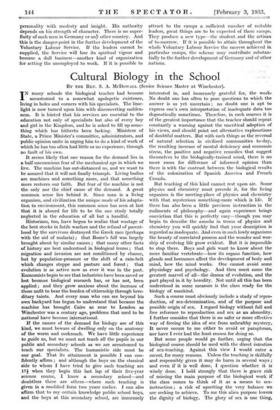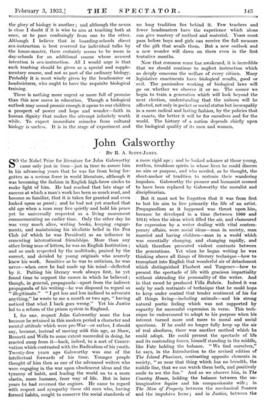Cultural Biology in the School
BY THE REV. S. A. McDowALL (Senior Science Master at Winchester).
IN many schools the biological teacher had become accustomed to a somewhat apologetic existence, living in holes and corners with his specialists. The lime- light is now turned upon him with disconcerting sudden- ness. It is hinted that his services are essential to the education not only of specialists but also of every boy and girl in the Kingdom, and he is asked to fill up some- thing which has hitherto been lacking. Ministers of State, a Prime Minister's committee, administrators, and public opinion unite in urging him to do a kind of work of which he has too often had little or no experience, through no fault of his own.
It seems likely that one reason for the demand lies in a half-unconscious fear of the mechanical age in which we live. The machine has out-distanced us, and we want to be assured that it will not finally triumph. Living bodies are machines and something more, and that something more restores our faith. But fear of the machine is not the only nor the chief cause of the demand. A great common sense lies behind it. Since man is a living organism, and civilization the unique mode of his adapta- tion to environment, this common sense has seen at last that it is absurd for life to be the one study totally neglected in the education of all but a handful.
Historians, too, have begun to- realize that wastage of the best stocks in futile warfare and the refusal of parent- hood by the survivors destroyed the Greek race (perhaps with the aid of malaria) ; that Rome's fall was largely brought about by similar causes ; that many other facts of history are best understood in biological terms ; that migration and invasion are not conditioned by chance, but by population-pressure or the shift of a rain-belt which changes steppe and pasture and forest ; that evolution is as active now as ever it was in the past. Economists begin to see that industries have been saved or lost because biological research has, or has 'not, been applied ; and they grow anxious about the increase of those unfit to bear the burden of citizenship through here- ditary taints. And every man who can see beyond his own backyard has begun to understand that because the machine has brought Cairo as near to London as Winchester was a century ago, problems that used to be national have become international.
If the causes of the demand for biology are of this kind, we must beware of dwelling only on the anatomy of the worm and cockroach. We have little experience to guide us, but we must not teach all the pupils in our public and secondary schools as we are accustomed to teach our specialists. The humanistic side must be our goal. That its attainment is possible I can con- fidently affirm ; and although the boys on the classical side to whom I have tried to give such teaching are 17i when they begin this last lap of their five-year science course, I know a secondary school—and doubtless there are others—where such teaching is given in a modified form two years earlier. I can also affirm that to my certain knowledge public school boys, and the boys at this secondary school, are immensely
interested in, and immensely grateful for, the work4 No doubt one has often to pose questions to which the answer is as yet uncertain ; no doubt one is apt to express one's own interpretation of inadequate data too dogmatically sometimes. Therefore, in such courses it is of the greatest importance that the teacher should repeat constantly a warning against the uncritical adoption of his views, and should point out alternative explanations of doubtful matters. But with such things as the reversal of natural selection in civilized conmiunities to-day, the resulting increase of mental deficiency and economic stress, the positive and negative remedies that suggest themselves to the biologically-trained mind, there is no more room for difference of informed opinion than there is with the contrast between the biological results of the colonization of Spanish America and French Canada.
But teaching of this kind cannot rest upon air. Some physics and chemistry- must precede it, for the living organism is the meeting-place of physics and chemistry with that mysterious something-more which is life. If there has also been a little previous instruction in the rudiments of philosophy—and again experience brings conviction that this is perfectly easy--though you may begin to describe the amoeba in terms of physics and chemistry you will quickly find that your description is regarded as inadequate. And even in such lowly organisms the beauty of correlated process and the wonder and wor- ship of evolving life grow evident. But it is impossible to stop there. Boys and girls want to know about the more familiar vertebrate—how its organs function, how glands and hormones affect the development of body and mind, how the mind works. One cannot avoid some physiology and psychology. And then must come the greatest marvel of all—the drama of evolution, and the part played in it by heredity. Not until all this has been understood in some measure is the class ready for the biology of mankind.
Such a course must obviously include a study of repro. duction, of sex-determination, and of the purpose and possible origin of sex. I regard biology without full and free reference to reproduction and sex as an absurdity. I further consider that there is no safer or more effective way of freeing the idea of sex from unhealthy mystery. It never occurs to me either to avoid or paraphrase, nor have I ever had the least reason for doing so.
But some people would go further, urging that the biological course should be used with the direct intention of sex-teaching. Against this view I would enter a caveat, for many reasons. Unless the teaching is skilfully and responsibly given it may do harm in several ways ; and even if it is well done, I question whether it is wisely done. I hold strongly that there is grave risk of missing the main purpose of the biological work if the class comes to think of it as a means to sex- instruction ; a risk of upsetting the very balance we are seeking to achieve. To me this alien purpose lowers the dignity of biology. The glory of sex is one thing,
the glory of biology is another ; and although the nexus is close I doubt if it is wise to aim at teaching both at once, or to pass confusingly from one to the other. Although I believe that in boarding-schools direct sex-instruction is best reserved for individual talks by the house-master, there certainly seems to be room in slay-schools for an additional course whose avowed intention is sex-instruction. All I would urge is that such teaching should be given as a special and supple- mentary course, and not as part of the ordinary biology. Probably it is most wisely given by the headmaster or -headmistress, who ought to have the requisite biological training.
There is nothing more urgent or more full of promise than this new move in education. Though a biological outlook may sound prosaic enough it opens to our children a prospect of power and hope and wonder—faith in 'human dignity that makes the attempt infinitely worth while. To expect immediate miracles from cultural biology is useless. It is in the stage of experiment and
no long tradition lies behind it. Few teachers and fewer headmasters have the experience which alone can give mastery of method and material. Years must pass before boys and girls can receive the full measure of the gift that avails them. But a new outlook and a new wonder will dawn on them even in the first tentative months.
Now that common sense has awakened, it is incredible that we should continue to neglect instruction which so deeply concerns the welfare of every citizen. Many legislative enactments have biological results, good or evil. The passionless working of biological laws will go on whether we observe it' or no. The sooner we begin to train a generation which will look beyond the next election, understanding that the unborn will be affected, not only in pocket or social status but inescapably in a more radical and lasting fashion, by the policies that it enacts, the better it will be for ourselves and for the world. The history of a nation depends chiefly upon the biological quality of its men and women.





































 Previous page
Previous page